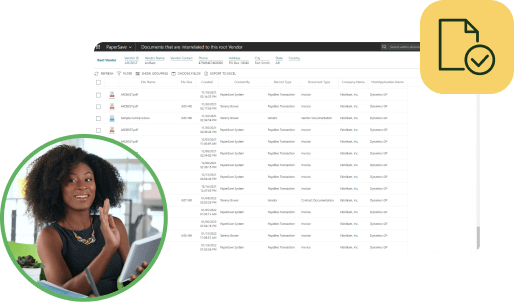
Wadih Pazos
Wadih founded both PairSoft and PaperSave. He is an avid technologist who specializes in streamlining operations and maximizing productivity.
View all posts by Wadih PazosWadih Pazos • October 18, 2013

If it’s been misfiled or even lost, the process of tracking down one piece of paper can take a significant amount of time. Normally, this doesn’t seem like it would be time consuming, but if done a few times a day, looking for a particular file can take many minutes, even hours out of an otherwise productive workday.
This is just part of the reason why so many companies across the United States are taking a closer look at embracing electronic workflow. Never mind the massive cost savings and freed up office space seen within a business that has implemented document management software, the convenience factor alone makes going digital worth the investment.
This way, files would be searchable through keywords and found in minutes. Backlogs and mix-ups would likely be a thing of the past.
This might be very attractive to healthcare facilities. There have been numerous reports coming out of the records departments of these kinds of institutions lately of lost paperwork, jams, and other ill effects of relying on paper-only systems. Like other offices, administrators at these types of corporations should consider converting to a digital landscape and saving themselves a lot of headaches.
A detriment to paper-only systems within hospitals is that it can take a while for medical professionals to find patient files, much like in a more traditional office setting. And similarly, this can make a productive day go down the drain. However, it’s likely going to be a sick individual that bears the brunt of the poor effects.
According to the Daily Express, doctors in the United Kingdom recently noted in a survey that many clinicians spend more time managing paperwork than they do with their patients. The report issued by the National Health Service revealed that 17 percent of healthcare providers said that their biggest concern within the industry is the fact that they have too much paperwork to properly handle.
A quarter of those same experts noted that they’ve delayed appointment times because they have to manually fill out and file records and 55 percent stated that this likely has a bad effect on recovery.
While finding particular records when there’s a digital system in place is made much easier, the same can often be said for filling out forms. This is because employees can upload premade templates and other helpful documents that would expedite the process.
Perhaps this would have been helpful were it in place at the Centers for Medicare & Medicaid Services (CMS), which was recently flooded with applications and other paperwork, leading to an administrative backlog, the Des Moines Register reported. The forms were from volunteers from numerous companies offering to help educate the public about the Affordable Care Act, as new clauses to the 2010 law keep rolling out.
CMS Health Insurance Specialist Bill Buck told the news source that going through all of the documents has been overwhelming, despite the positive interest. Were these documents filed via an electronic platform, sorting may have been simpler.
Automated workflows empower your team to focus on larger, more complex initiatives without having to think about small processes.


